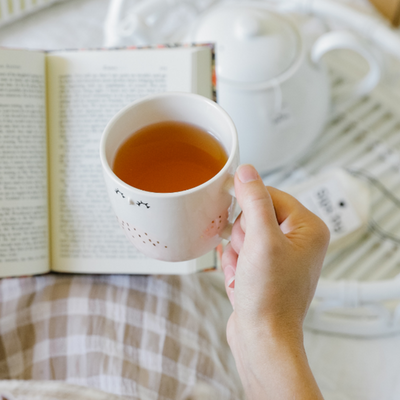We've all heard it: "Tea is healthy." Tea is a superfood, natural, organically grown, vegan, gluten free, and has general wellness and traditional medicinal uses that date back thousands of years. But what are the specifics behind what makes tea healthy? Is tea the most affordable day-to-day wellness consumable? How can tea promote my general well being? My general physical health?
In its earliest days, tea was used as a medicinal herb. During the time that Daoists were searching for immortality, tea was recognized as an elixir of life, and medicinal tea was known as tonic tea, used to preserve health and lengthen one’s life instead of simply curing a disease. Tea ceremonies were developed by various cultures around the world to enhance the physical effects of tea on the human body, specifically the ability to rejuvenate, relax, enhance mental capacity, and elevate mood.
In modern times, green tea has been marketed as a "fat burning" product, and there are many businesses which have been built on featuring tea for its slimming affect. From a slow and mindful living perspective, tea has deep roots in promoting meditation. Naturopaths laud tea and herbal blends for their curative properties. The rest of us, especially those of us here in the U.S. without a deep-rooted tea culture, are left wondering: "what makes tea healthy?"
Sips by is a personalized tea discovery subscription. Each month, we match tea drinkers across the U.S. with delicious teas from over 150 global tea brands that we’re sure they’ll love. Members receive 4 teas chosen just for them in every box. Learn more about our tea subscription service.


We'll go more deeply into this topic in more Steep Society blog posts, but here are the absolute basics you should know about "What makes tea healthy?" to get started.
L-THEANINE
With the rise of Buddhism, meditating monks would drink tea to avoid falling asleep and to stay mentally focused. Many believe that L-theanine is responsible for what Monks enjoyed about tea. L-theanine (also called "theanine") is a nondietary amino acid found naturally in the camellia sinensis (tea) plant. Many believe the synergy between l-theanine and caffeine reduces mental and physical stress, improves cognition, and boosts mood and cognitive performance.
RELAXING: Research shows that this amino acid neutralizes the negative jitter-inducing effects of caffeine without reducing its mind-energizing, fat-burning capabilities. It helps relax the body and calm the mind, without causing drowsiness.
SLEEP: Research indicates that daily intake of L-theanine causes better quality sleep. It doesn’t necessarily cause you to sleep longer, but you may start to feel more refreshed when you wake up, even with the same duration of sleep.
MOOD: L-theanine enhances mood by altering serotonin and other neurotransmitters in the brain. Try drinking tea in a beautiful spot in nature or with some peaceful music for an even greater mood boost! You can get some great tea options in our Mood-Boosting Tea Box.
BRAIN HEALTH: Research indicates that drinking tea cuts risk of stroke. It is believed that, if theanine is present in the body at the time of a stroke, the damaged area may be reduced significantly. Theanine is also connected to the suppression of glucocorticoids, which are stress hormones that disrupt brain chemistry and are linked to stress, depression, and reduction in brain function. Holy Basil Green by The Tea Heaven is your brain's best friend. Need more tea options? Check out the Best Teas for Stress & Anxiety.
DETOXIFICATION: It has been found that the liver responds well to theanine. It may be able to accelerate the breakdown of toxins and block free radicals. This Cinnamon Lemon Detox Tea recipe is a super simple detox boost that can be made using your favorite tea.
TEA TYPES & TIPS: Theanine can be found in varying levels in all types of tea, and the level of theanine depends on a variety of factors, including the age of the leaf, the time of harvest, the growing climate and - maybe most importantly - how much sunlight the leaves are exposed to. It is generally believed that younger buds have higher concentrations of theanine, and that shading the leaves while they grow also increases the level. The highest levels of theanine are found in high quality Japanese green teas that are grown in shade before they are harvested. The reduction of sunlight alters the flavor profile and chemical composition of the leaf by increasing chlorophyll, caffeine, theanine, and nutrients pulled from the soil, and reducing polyphenols and astringency, leading to a full-bodied, umami-rich flavor. Matcha and gyokuro are the most well known shade-grown teas of Japan. With matcha, you consume the full leaf, so you're getting the highest l-theanine concentration. Gyokuro is a high-grade green tea that is also shaded before it is harvested.
Want to try more healthy teas? Here are a few of our favorites:
Interested in trying these teas and others? Subscribers receive 4 teas chosen just for them in every box. Learn more about our tea subscription box or explore the loose leaf tea shop.
POLYPHENOLS / CATECHINS / ANTIOXIDANTS
You may have heard these buzzwords used when describing the health benefits of tea - we know they are good - keep reading to learn more about them. Polyphenols are plant metabolites produced as a defense against insects and other environmental threats – they are derived from amino acids via sunlight, so teas grown in shade (like matcha and gyokuro as mentioned above) have more amino acids and less polyphenols. Flavenoids are an important group of polyphenols, and flavanols are the most prevalent group within the flavonoid group. Catechins are the major flavenols in tea – they are antioxidants, the most potent of which is EGCG. Some of the health benefits associated with catechins are:
ANTI-CANCER: Oxidative damage contributes to the development of cancer, and antioxidants can have a protective effect and may reduce risk or slow growth of cancer.
ANTIBACTERIAL: Studies suggest catechins can kill bacteria and inhibit viruses, lowering risk of infections and improving dental health.
FAT BURNING: Benefits of catechins from green tea have been observed on lipid oxidation and fat-burning pathways, but only with very high doses of EGCG.
TEA TYPES & TIPS: Green and white teas have been known to exhibit the highest antioxidant levels. Teas with younger leaves and buds (especially first flush) usually contain the highest concentration of catechins – a famous example is Silver Needle white tea, which is made entirely of buds. For a caffeine-free herbal alternative, South African rooibos (not from the tea plant) is very high in antioxidants as well! Because catechins are not stable, they deteriorate when they come into a lot of contact with oxygen, light, moisture and other reactive substances in the environment. Proper storage and care is vital for maintaining the antioxidant benefits of tea.
FACTORS AFFECTING HEALTH BENEFITS / CHEMICAL COMPOSITION
LONGER STEEP TIME: More polyphenols/tannins are released (note: this also increases the bitterness).
DECAFFEINATION: Lowers levels of catechins.
INSTANT/BOTTLED TEA: Lowers levels of polyphenols.
ADDING MILK: Could decrease effect of catechins because of the milk binding to catechins. If the milk is whole dairy milk, saturated fat and sugar content goes up.
ADDING LEMON: May enhance body’s absorption of catechins and may protect against kidney stones.
TEAS KNOWN FOR CERTAIN HEALTH BENEFITS
PU-ERH: Pu-erh has long been used in Traditional Chinese Medicine. Studies indicate Pu-erh could be the only tea that lowers bad cholesterol (LDL) while increasing good cholesterol (HDL). Microbial aging can result in the production of lovastatin, a natural statin (statins are used medicinally to lower bad cholesterol). It also may reduce blood sugar and help prevent diabetes. Pu-erh is great for after meals, and promotes digestion, metabolism and elimination of toxins.
KUKICHA: Kukicha is a Japanese blend made of stems, stalks and twigs of the tea plant. It is one of the preferred teas in the macrobiotic diet, as it has an alkalizing effect on the body and lowers acidity. It is also very low in caffeine, contains high levels of vitamins and minerals (that feed the growth parts of the tea plant), and contains more calcium than dairy milk.
Try similar teas with your own Sips by Box.
* These statements have not been evaluated by the Food and Drug Administration. These products are not intended to diagnose, treat, cure, or prevent any disease.
Wellness Tea Shop
Discover new wellness teas for you to enjoy, feel better, and be more relaxed. Shop caffeine-free teas, herbal teas, and more. Explore our latest tea collections meant to help your overall wellness in areas like skin health, energy, digestion, and sore throats. Take care of your body while relaxing with a hot cup of tea. Explore powerful tea remedies in the new Wellness Tea Shop!
![]()
Interested in trying these teas and others? Subscribers receive 4 teas chosen just for them in every box. Learn more about our tea subscription box or explore the loose leaf tea shop.
About Sips by: We’re a female-founded and led startup that makes discovering tea fun, personalized, and affordable. The Sips by Box is the only multi-brand, personalized tea subscription box. Each month, we match tea drinkers across the U.S. with delicious teas from over 150 global tea brands that we’re sure they’ll love. Based out of Austin, Texas, we are adept at savoring a hot mug even when it’s seasonally inappropriate.




1 Comment
Cant wait to try your guys hopefully it’ll come soon for me to try it